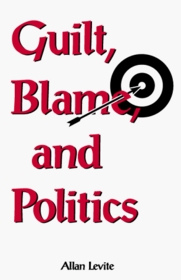Search -
Guilt, Blame, and Politics
Guilt Blame and Politics
Author:
This book examines the relationship between guilt and political ideologies. It deals with "political" guilt, which is viewed as a philosophic perspective, not a psychological abnormality. "Political" guilt is defined as the belief that one belongs to a group of people that has unjust or unduly fortunate privileges. (When people hold themselves a... more »
Author:
This book examines the relationship between guilt and political ideologies. It deals with "political" guilt, which is viewed as a philosophic perspective, not a psychological abnormality. "Political" guilt is defined as the belief that one belongs to a group of people that has unjust or unduly fortunate privileges. (When people hold themselves a... more »
ISBN-13: 9780966694307
ISBN-10: 0966694309
Publication Date: 10/30/1998
Pages: 260
Edition: 1
Rating: ?
ISBN-10: 0966694309
Publication Date: 10/30/1998
Pages: 260
Edition: 1
Rating: ?
0 stars, based on 0 rating
Genres:
- Nonfiction >> Politics >> History & Theory
- Politics & Social Sciences >> Politics & Government >> Ideologies & Doctrines >> Communism & Socialism
- Nonfiction >> Social Sciences >> Sociology >> General




